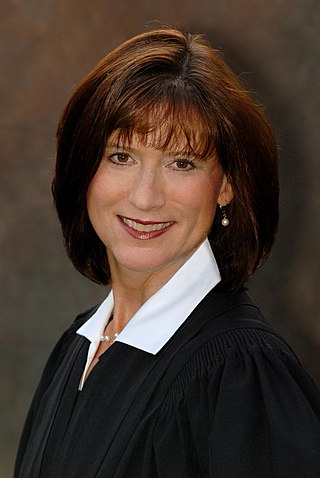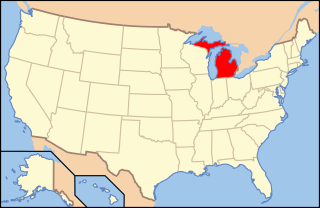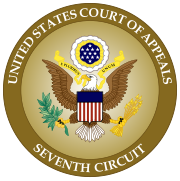
The Civil Rights Act of 1964 is a landmark civil rights and labor law in the United States that outlaws discrimination based on race, color, religion, sex, and national origin. It prohibits unequal application of voter registration requirements, racial segregation in schools and public accommodations, and employment discrimination. The act "remains one of the most significant legislative achievements in American history".
Oncale v. Sundowner Offshore Services, 523 U.S. 75 (1998), is a landmark decision of the US Supreme Court. The case arose out of a suit for sex discrimination by a male oil-rig worker, who claimed that he was repeatedly subjected to sexual harassment by his male co-workers with the acquiescence of his employer. The Court held that the protection of Title VII of the Civil Rights Act of 1964 against workplace discrimination "because of... sex" applied to harassment in the workplace between members of the same sex.

Anti-discrimination law or non-discrimination law refers to legislation designed to prevent discrimination against particular groups of people; these groups are often referred to as protected groups or protected classes. Anti-discrimination laws vary by jurisdiction with regard to the types of discrimination that are prohibited, and also the groups that are protected by that legislation. Commonly, these types of legislation are designed to prevent discrimination in employment, housing, education, and other areas of social life, such as public accommodations. Anti-discrimination law may include protections for groups based on sex, age, race, ethnicity, nationality, disability, mental illness or ability, sexual orientation, gender, gender identity/expression, sex characteristics, religion, creed, or individual political opinions.

Diane Schwerm Sykes is an American jurist and lawyer who serves as the chief judge of the U.S. Court of Appeals for the Seventh Circuit. She served as a justice of the Wisconsin Supreme Court from 1999 to 2004.

Welsh v. Boy Scouts of America, 993 F.2d 1267, was a decision by the United States Court of Appeals for the Seventh Circuit that upheld the right of private organizations to discriminate on the basis of religion when establishing their own membership standards.

Diane Pamela Wood is an American attorney who serves as the director of the American Law Institute and a senior lecturer at the University of Chicago Law School. She previously served as a circuit judge on the United States Court of Appeals for the Seventh Circuit.
Burlington Northern & Santa Fe (BNSF) Railway Co. v. White, 548 U.S. 53 (2006), is a US labor law case of the United States Supreme Court on sexual harassment and retaliatory discrimination. It was a landmark case for retaliation claims. It set a precedent for claims which could be considered retaliatory under Title VII of the Civil Rights Act of 1964. In this case the standard for retaliation against a sexual harassment complainant was revised to include any adverse employment decision or treatment that would be likely to dissuade a "reasonable worker" from making or supporting a charge of discrimination.
Sexual orientation discrimination is discrimination based on a person's sex, sexual orientation, gender identity, or pregnancy.
The Bennett Amendment is a United States labor law provision in the Title VII of the Civil Rights Act of 1964, §703(h) passed to limit sex discrimination claims regarding pay to the rules in the Equal Pay Act of 1963. It says an employer can "differentiate upon the basis of sex" when it compensates employees "if such differentiation is authorized by" the Equal Pay Act.
Joel Martin Flaum is a senior United States circuit judge of the United States Court of Appeals for the Seventh Circuit and a former United States District Judge of the United States District Court for the Northern District of Illinois.

Lesbian, gay, bisexual, and transgender (LGBTQ) people in the U.S. state of Michigan enjoy the same rights as non-LGBTQ people. Michigan in June 2024 was ranked "the most welcoming U.S. state for LGBT individuals". Same-sex sexual activity is legal in Michigan under the U.S. Supreme Court case Lawrence v. Texas, although the state legislature has not repealed its sodomy law. Same-sex marriage was legalised in accordance with 2015's Obergefell v. Hodges decision. Discrimination on the basis of both sexual orientation and gender identity is unlawful since July 2022, was re-affirmed by the Michigan Supreme Court - under and by a 1976 statewide law, that explicitly bans discrimination "on the basis of sex". The Michigan Civil Rights Commission have also ensured that members of the LGBT community are not discriminated against and are protected in the eyes of the law since 2018 and also legally upheld by the Michigan Supreme Court in 2022. In March 2023, a bill passed the Michigan Legislature by a majority vote - to formally codify both "sexual orientation and gender identity" anti-discrimination protections embedded within Michigan legislation. Michigan Governor Gretchen Whitmer signed the bill on March 16, 2023. In 2024, Michigan repealed “the last ban on commercial surrogacy within the US” - for individuals and couples and reformed the parentage laws, that acknowledges same sex couples and their families with children.

Lesbian, gay, bisexual, transgender, and queer (LGBTQ) rights in the U.S. state of Indiana have been shaped by both state and federal law. These evolved from harsh penalties established early in the state's history to the decriminalization of same-sex activity in 1977 and the legalization of same-sex marriage in 2014. Indiana was subject to an April 2017 federal court ruling that discrimination based on sexual orientation is tantamount to discrimination on account of "sex", as defined by the Civil Rights Act of 1964. The ruling establishes sexual orientation as a protected characteristic in the workplace, forbidding unfair discrimination, although Indiana state statutes do not include sexual orientation or gender identity among its categories of discrimination.

LGBT employment discrimination in the United States is illegal under Title VII of the Civil Rights Act of 1964; employment discrimination on the basis of sexual orientation or gender identity is encompassed by the law's prohibition of employment discrimination on the basis of sex. Prior to the landmark cases Bostock v. Clayton County and R.G. & G.R. Harris Funeral Homes Inc. v. Equal Employment Opportunity Commission (2020), employment protections for LGBT people were patchwork; several states and localities explicitly prohibit harassment and bias in employment decisions on the basis of sexual orientation and/or gender identity, although some only cover public employees. Prior to the Bostock decision, the Equal Employment Opportunity Commission (EEOC) interpreted Title VII to cover LGBT employees; the EEOC determined that transgender employees were protected under Title VII in 2012, and extended the protection to encompass sexual orientation in 2015.
Title IX of the United States Education Amendments of 1972 prohibits discrimination "on the basis of sex" in educational programs and activities that receive financial assistance from the federal government. The Obama administration interpreted Title IX to cover discrimination on the basis of assigned sex, gender identity, and transgender status. The Trump administration determined that the question of access to sex-segregated facilities should be left to the states and local school districts to decide. The validity of the executive's position is being tested in the federal courts.
Hively is a surname. Notable persons with this name include:
Altitude Express, Inc. v. Zarda, 590 U.S. ___ (2020), is a landmark United States Supreme Court civil rights case which ruled that under Title VII of the Civil Rights Act of 1964 employees could not be discriminated against on the basis of sexual orientation or gender identity.
R.G. & G.R. Harris Funeral Homes Inc. v. Equal Employment Opportunity Commission, 590 U.S. ___ (2020), is a landmark United States Supreme Court case which ruled that Title VII of the Civil Rights Act of 1964 protects transgender people from employment discrimination.
Bostock v. Clayton County, 590 U.S. 644 (2020), is a landmark United States Supreme Court civil rights decision in which the Court held that Title VII of the Civil Rights Act of 1964 protects employees against discrimination because of sexuality or gender identity.









